
Listen—if you’re going to stage a coup, secretly invoke the Insurrection Act, and declare martial law, who *better* to conspire with than the MyPillow guy?!?
And just for the record, no—none of this could actually work. Under the absolute terms of Section 1 of the Twentieth Amendment, Trump’s term is over at noon (EST) on Wednesday, no matter how much nonsense he — or his “advisers” — tries to pull between now and then.
As for the Insurrection Act, one more reminder that invoking it is *not* tantamount to invoking “martial law.”
The military under that statute is tasked with enforcing the same laws as civilian law enforcement — *supplementing* civilian law enforcement, not *supplanting* it.
The military under that statute is tasked with enforcing the same laws as civilian law enforcement — *supplementing* civilian law enforcement, not *supplanting* it.
Here's a more detailed #thread from me unpacking the legal analysis:
https://twitter.com/steve_vladeck/status/1350218820355559424?s=20
• • •
Missing some Tweet in this thread? You can try to
force a refresh









